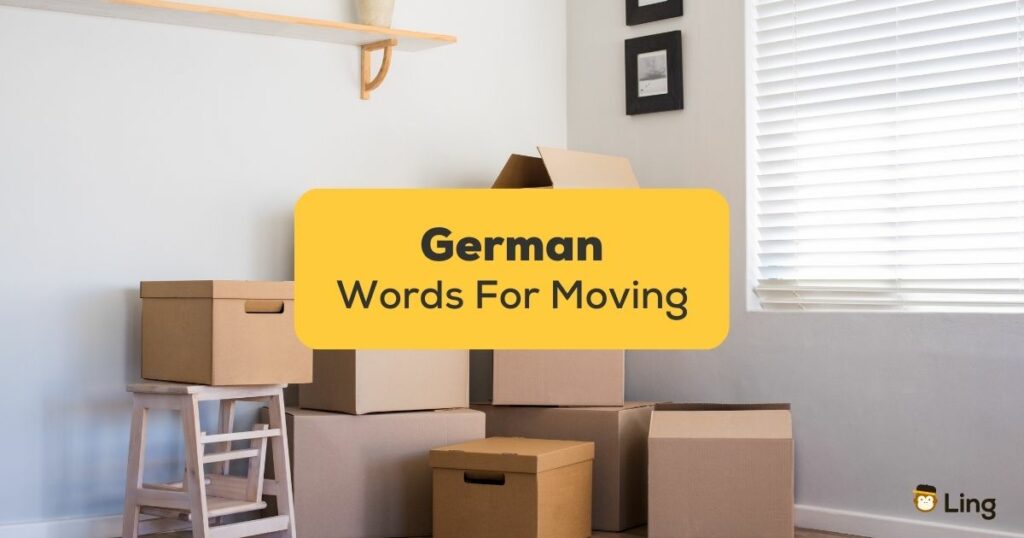Struggling with German words for moving house? We totally get you! Moving house or der Umzug can be both an exhilarating and challenging endeavor, no matter where in the world it takes place. However, when moving house in a country like Germany, with its unique language and cultural nuances, the process can be particularly daunting for non-German speakers. Each step, from finding accommodation to packing and finally settling into your new home, involves understanding and using specific German words and phrases.
The primary aim of this article is to provide a comprehensive guide on these important German words associated with moving house. Whether you’re planning a move to Germany or simply interested in enhancing your German vocabulary, you’ll find this guide invaluable. It covers various categories, such as types of accommodation, essential verbs, administrative terms, and handy phrases for moving days. Let’s embark on this linguistic journey and make your German moving experience as seamless as possible. So let’s get started, shall we?
The Concept Of Moving In Germany
Moving house in Germany, known as “umziehen,” is a significant event that often requires a significant amount of planning and organization. Unlike the process in some countries, where it can be relatively informal, moving in Germany is typically a well-structured endeavor with specific procedures to follow.
House Hunting In Germany
Firstly, when you decide to move, you need to notify your current landlord. This notification, or “Kündigung,” usually needs to be submitted at least three months before the intended moving date. Also, remember to check your “Mietvertrag” (rental agreement) for any specific conditions related to moving out.
The house hunting process, or “die Wohnungssuche,” can be competitive, especially in larger cities like Berlin, Munich, or Hamburg. It involves viewing properties (“Besichtigung“), potentially competing with other prospective tenants, and convincing the landlord or the real estate agent (“Makler“) of your reliability. Key terms during this stage include “die Kaution” (deposit), which is usually the equivalent of three months’ rent, and “Provision” (commission), which is the fee for the estate agent, if any.
Unsure what type of place to move to? Here are some words that can help out:
| English | German |
|---|---|
| Apartment | Wohnung |
| House | Haus |
| Condominium | Eigentumswohnung |
| Studio Apartment | Einzimmerwohnung |
| Shared Apartment (Flatshare) | Wohngemeinschaft (WG) |
| Homestay | Gasthaus |
| Detached House | Einfamilienhaus |
| Duplex | Doppelhaus |
| Townhouse | Reihenhaus |
| Loft | Loft |
| Penthouse | Penthouse |
| Student Dormitory | Studentenwohnheim |
| Serviced Apartment | Serviced-Apartment |
| Holiday Home | Ferienhaus |
| Farmhouse | Bauernhaus |
| Bungalow | Bungalow |

The Actual Moving-In Process In Germany
After signing the new rental agreement, the real “Umzug” begins. This term covers the physical process of moving your belongings from the old place to the new one. During this stage, you might work with an “Umzugsunternehmen” (moving company), use a “Umzugswagen” (moving van), and pack your belongings in “Umzugskartons” (moving boxes).
Once you’re ready to move in or “Einzug,” you’ll have to communicate with several local authorities and handle different documents. Understanding the relevant German vocabulary will ensure smoother interactions and a better understanding of the process. Here are some important German words and phrases you should know when dealing with authorities during your move.
- Einwohnermeldeamt: This is the residents’ registration office where you are required to register your new address after moving. If you’re moving within the same city, you’ll need to update your address here.
- Anmeldung: Anmeldung refers to the process of registering your residence. Upon moving into a new house or apartment in Germany, you have to perform the Anmeldung at your local Einwohnermeldeamt.
- Abmeldung: Abmeldung is the opposite of Anmeldung. It refers to the deregistration process. If you’re moving out of Germany or to a new German city, you’ll need to perform Abmeldung at your current residence’s Einwohnermeldeamt.
- Ummeldung: If you’re moving within the same city, you won’t deregister (Abmeldung) but will instead change your registered address. This process is known as Ummeldung.
- Anmeldebestätigung: After you have registered (Anmeldung) your new address, you will receive a registration confirmation, known as Anmeldebestätigung. This document can be important for various other processes, such as setting up a bank account or getting a phone contract.
- Meldebescheinigung: This is the document you receive from the Einwohnermeldeamt after successful Anmeldung, Abmeldung, or Ummeldung. It’s proof of your current registered address. You may need this everywhere where you have to change your address, e.g. your bank, health insurance or your employer.
- Personalausweis: Your German ID card, which you’ll need for various procedures, including registering your new address.
- Mietvertrag: Your rental agreement, which you’ll need to present during the Anmeldung as proof that you really reside at the new address.
Understanding these terms will make dealing with the authorities a lot easier when moving house in Germany. Remember, the key to a smooth move is preparation and understanding of the process. So, take the time to familiarize yourself with these words and their meanings.
The Housewarming Party In Germany
In Germany, moving house is not only about changing your physical location. It’s also about integrating into a new community. A traditional “Einzugsparty” (housewarming party) is a good way to meet your new neighbors and start feeling at home.
Thus, understanding these elements of moving house in Germany and familiarizing yourself with the relevant vocabulary can make the process much smoother and more enjoyable.

German Words For Moving House
Moving house involves more than just physical relocation. It is a process filled with various tasks and actions, each requiring its unique verb. Understanding these verbs and their meanings can make your moving process smoother, particularly when interacting with locals, moving companies, or government offices. In this section, we’ve compiled a list of essential English verbs related to moving house and their German equivalents.
| English | German |
|---|---|
| To move (house) | umziehen |
| To pack | einpacken |
| To unpack | auspacken |
| To load | beladen |
| To unload | entladen |
| To carry | tragen |
| To dismantle | abbauen |
| To assemble | aufbauen |
| To arrange | anordnen |
| To decorate | dekorieren |
| To rent | mieten |
| To lease | vermieten |
| To buy | kaufen |
| To sell | verkaufen |
| To clean | putzen |
| To register (a new address) | anmelden |
| To deregister (an old address) | abmelden |
| To notify | benachrichtigen |
| To search (for a house) | suchen |
| To view (a property) | besichtigen |
| To sign (a contract) | unterschreiben |

Handy Phrases For The Moving Day
The day of moving, known as “Umzugstag” in German, can be full of excitement and, sometimes, a bit of chaos. Effective communication with the movers, neighbors, and possibly your new landlord can make things go much smoother. In this regard, knowing some handy German phrases can be a real game-changer. Here are some practical phrases you might find useful on your moving day:
| English | German |
|---|---|
| Where should we place this? | Wo sollen wir das hinstellen? |
| Be careful with the vase! | Vorsichtig mit der Vase! |
| This box is heavy. | Diese Box ist schwer. |
| Can you help me with this? | Kannst du mir damit helfen? |
| The furniture goes into the living room. | Die Möbel kommen ins Wohnzimmer. |
| This is fragile. | Das ist zerbrechlich. |
| We need to assemble the bed. | Wir müssen das Bett aufbauen. |
| This goes upstairs. | Das geht nach oben. |
| I think that’s everything. | Ich denke, das ist alles. |
| Thank you for your help. | Danke für deine Hilfe. |
By using these phrases, you’ll be able to provide clear instructions, prevent potential misunderstandings, and express your gratitude to those helping you on the day. This can go a long way in ensuring your moving day in Germany is as stress-free as possible.
Want To Master The German Language?
As we discovered in this post, moving house in Germany involves several tasks, each accompanied by its unique vocabulary. Hopefully, this article has offered you an introduction to the essential German words and phrases related to moving house, from house hunting to dealing with authorities and managing the moving day.
However, learning a language is an ongoing process!
To truly master the German language, constant practice and immersion are crucial. If you’re interested in expanding your German vocabulary beyond moving house and diving deeper into the language and culture, the Ling app is a fantastic resource. It offers interactive language learning with a focus on real-life situations, like moving house, making it a practical tool for anyone planning to move to Germany or simply interested in learning the language.
Ready to give it a try? Download it today for FREE from the App Store or Play Store now to get started!



































































